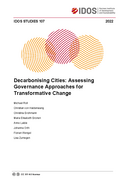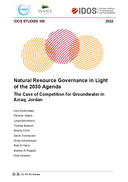In der Reihe Studies veröffentlicht das German Institute of Development and Sustainability (IDOS) umfangreiche wissenschaftliche Studien und praxisorientierte Gutachten zu regional- und themenspezifischen Fragestellungen mit empirischen Bezügen sowie die Berichte der Forschungsteams des IDOS-Postgraduierten-Programms. Studies können kostenlos heruntergeladen oder zum Preis von 10,00 € beim IDOS bestellt werden. Dies gilt nur für die früheren „DIE Studies“ im Buchformat. Die neu designte Reihe „IDOS Studies“ ist eine reines Onlineformat. Bitte wenden Sie sich per E-Mail oder postalisch an unsere Publikationsstelle.
Publikationensuche
107 Ergebnisse
Zeige Ergebnisse 1 bis 20 von 107.


